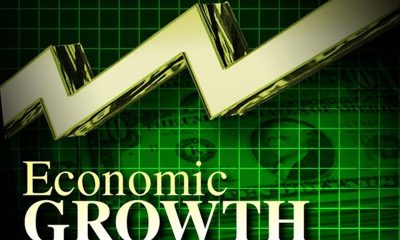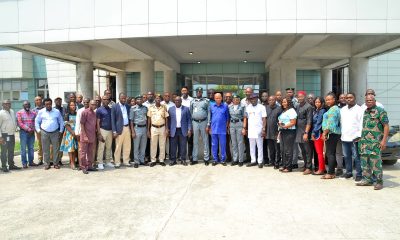Economy
FBNQuest Sees Education as Catalyst for Economic Growth

Across the globe, organisations have intensified efforts towards preparing their workforce for the demands of the future.
The preparation comes in the form of education (or training), that is, upskilling (technical, soft skills, mentorship) and digitisation training programs which will avail workers the ability to acquire knowledge, skills, tools and the ability to use the ever-changing technologies in their workplaces and private affairs.
As a critical component of a country’s human capital, evidence abounds as justifications for investing in educating the workforce: a leading determinant of economic growth, employment, and earnings.
The need for education in all its form cannot be overemphasised in this rapidly changing world. For instance, 2020 in retrospect, particularly between the second (Q2) and third quarter (Q3), have it that the global economy witnessed a significant amount of disruption.
From SMEs to big corporations, economic activities were at a standstill. Despite the technological advancement of the Organisation for Economic Co-operation and Development (OECD) countries, the tale was not palatable.
The world’s biggest economy, the United States, was not left out as its economy plunged by 31.4 per cent within the period. The Eurozone witnessed a 12.1 per cent decline in its real GDP growth rate by the same period, and the impacted some economies within the Euro area.
Spain’s real GDP growth rate declined by 18.5 per cent; France’s fell by 13.8 per cent, Italy saw its real GDP decline by 12.4 per cent, while Germany’s sank by 10.1 per cent.
Further, some countries including Africa’s biggest economy, Nigeria, slumped into recession. This spiralled into a significant amount of job loss across every sector of the economy, not leaving the western world behind.
As a bounce back, education took its role leading to inventions and innovations. The lockdown forced companies and businesses to think outside the box for a quick fix—upskilling their workforce. Consequently, companies in Nigeria began to train their workforce to adopt digital means of doing business which then led to remote working as part of the new normal.
In effect, technology came atop as one of the catalysts that individuals, firms and government turned to inject life into their businesses and other activities.
From virtual meetings to online learning, mobile technology and online support for offline sectors, governments and corporate bodies switched to the new normal. Apps like Zoom, Google Meet, GoToMeeting, Join Me, Webex, Slack and Microsoft Teams to mention a few became a central platform for conferencing.
According to Sensor Tower, the global app revenue jumped to $50 billion in the first half of 2020, representing 26.1 per cent of the corresponding quarter in 2019, and partly due to COVID-19, with Google Play taking the largest chunk of the global revenue.
Although training and capacity building remains a critical pillar in recent times, the process of developing human capital through education requires creating the necessary environment in which employees can learn better, apply innovative ideas, acquire new competencies, develop skills, behaviours and attitudes.
Education can be formal, informal and non-formal with the desire to get improved performance, enhance innovation in new strategies and products, reduce employee turnover, and boost the organisational profiles. This consequently affects the gross domestic product (GDP) of a country. A country’s economy becomes more productive as the proportion of educated workers increases.
Education, through digital technology, has started to transform the lives of smallholder farmers, thus reducing post-harvest losses, by having the means to better storage and processing facilities and access to market information and subsidized farm inputs.
With the introduction of Onecourse, a software application that improves reading, writing and mathematics, the Malawian government was able to narrow the gender gap in reading and mathematics skills. Rwanda implemented a mobile app called Babyl. With this app, patients are given information about their symptoms and referral givens when it becomes unavoidable.
The Nigerian labour force demonstrates the characteristics of individuals who urgently need training such as coding and innovation to be relevant in the 21st-century workplace.
According to the recent labour force data, 30 per cent of Nigerians never attended school. Further analysis shows that 17 per cent had primary school certificates, 36 per cent had secondary school certificates, while those in possession of degree and higher certificates constituted 20 per cent of the nation’s workforce.
Even within this group, 8 per cent have Ordinary National Diploma(OND)/Nigeria Certificate In Education (NCE) certifications; 9 per cent have first degrees (BA/BSc/Bed/HND), while 1 per cent have post-graduate degrees (MSc/MA/MAdmin).
Above this is the 0.1 per cent group which have doctorate degrees. However, according to the Minister of Education, Adamu Adamu, the number of out-of-school children had dropped from 10.1 million in 2019 to 6.5 million in 2020. This shows an intentional effort by parents, governments and organisations to narrow the gap as well as tackle the prevalent challenges, albeit primary education is officially free.
Some organisations envisaged the impact of education/training as a catalyst for Nigeria’s economic growth in Nigeria’s economy. To corroborate this, analysts at Businessday Research and Intelligence Unit (BRIU) understudied the impact of upskilling and digital transformation in driving economic growth in Nigeria.
From the report, it was projected that the Nigerian economy will grow by $8.79 billion by 2023 and this growth will be largely driven by some sectors—ICT, agriculture, health, finance and insurance sectors— and by companies that spend more on training, research and development and technology acquisition.
In this light, FBNQuest, through its Corporate Responsibility and Sustainability (CR&S), continues to focus on knowledge and skills development for economic growth.
Thousands of students have been trained in financial literacy which includes ways to earn, save and grow money; hundreds of women have also been trained on financial literacy through female economic empowerment and capacity building initiatives; A Bloomberg Room was set up in Lagos Business School (LBS) to help students gain access to real-time financial data through the use of the Bloomberg Terminals; employees have volunteered to mentor Teach For Nigeria (TFN) fellows; to mention a few.
Research shows that several present-day jobs may disappear in the next few years, while the jobs of the future are not yet created, requiring that workforces across different sectors need new skills while for firms to remain competitive, digitalisation is the way to go.
In all, it is envisaged that the gross domestic product of many economies will increase noticeably due to the implementation of upskilling and digitisation programs across the world.
Economy
Adedeji Urges Nigeria to Add More Products to Export Basket

By Adedapo Adesanya
The chairman of the Nigeria Revenue Service (NRS), Mr Zacch Adedeji, has urged the country to broaden its export basket beyond raw materials by embracing ideas, innovation and the production of more value-added and complex products
Mr Adedeji said this during the maiden distinguished personality lecture of the Faculty of Administration, Obafemi Awolowo University (OAU), Ile-Ife, Osun State, on Thursday.
The NRS chairman, in the lecture entitled From Potential to Prosperity: Export-led Economy, revealed that Nigeria experienced stagnation in its export drive over three decades, from 1998 to 2023, and added only six new products to its export basket during that period.
He stressed the need to rethink growth through the lens of complexity by not just producing more of the same stuff, lamenting that Nigeria possesses a high-tech oil sector and a low-productivity informal sector, as well as lacking “the vibrant, labour-absorbing industrial base that serves as a bridge to higher complexity,” he said in a statement by his special adviser on Media, Dare Adekanmbi.
Mr Adedeji urged Nigeria to learn from the world by comparative studies of success and failure, such as Vietnam, Bangladesh, Indonesia, South Africa, and Brazil.
“We are not just looking at numbers in a vacuum; we are looking at the strategic choices made by nations like Vietnam, Indonesia, Bangladesh, Brazil, and South Africa over the same twenty-five-year period. While there are many ways to underperform, the path to success is remarkably consistent: it is defined by a clear strategy to build economic complexity.
“When we put these stories together, the divergence is clear. Vietnam used global trade to build a resilient, complex economy, while the others remained dependent on natural resources or a single low-tech niche.
“There are three big lessons here for us in Nigeria as we think about our roadmap. First, avoiding the resource curse is necessary, but it is not enough. You need a proactive strategy to build productive capabilities,” he stated, adding that for Nigeria, which is at an even earlier stage of development and even less diversified than these nations, the warning is stark.
“Relying solely on our natural endowments isn’t just a path to stagnation; it’s a path to regression. The global economy increasingly rewards knowledge and complexity, not just what you can dig out of the ground. If we want to move from potential to prosperity, we must stop being just a source of raw materials and start being a source of ideas, innovation, and complex products,” the taxman stated.
He added that President Bola Tinubu has already begun the difficult work of rebuilding the economy, building collective knowledge to innovate, produce, and build a resilient economy.
Economy
Nigeria Inaugurates Strategy to Tap into $7.7trn Global Halal Market

By Adedapo Adesanya
President Bola Tinubu on Thursday inaugurated Nigeria’s National Halal Economy Strategy to tap into the $7.7 trillion global halal market and diversify its economy.
President Tinubu, while inaugurating the strategy, called for disciplined, inclusive, and measurable action for the strategy to deliver jobs and shared prosperity across the country.
Represented by Vice-President Kashim Shettima, he described the unveiling of the strategy as a signal of Nigeria’s readiness to join the world in grabbing a huge chunk of the global halal economy already embraced by leading nations.
“As well as to clearly define the nation’s direction within the market, is expected to add an estimated $1.5 billion to the nation’s Gross Domestic Product (GDP) by 2027. It is with this sense of responsibility that I formally unveil the Nigeria National Halal Economy Strategy.
“This document is a declaration of our promise to meet global standards with Nigerian capacity and to convert opportunity into lasting economic value. What follows must be action that is disciplined, inclusive, and measurable, so that this Strategy delivers jobs, exports, and shared prosperity across our nation.
“It is going to be chaired by the supremely competent Minister of Industry, Trade and Investment.”
The president explained that the halal-compliant food exports, developing pharmaceutical and cosmetic value chains would position Nigeria as a halal-friendly tourism destination, and mobilising ethical finance at scale,” by 2030.
“The cumulative efforts “are projected to unlock over twelve billion dollars in economic value.
“While strengthening food security, deepening industrial capacity, and creating opportunities for small-and-medium-sized enterprises across our states,” he added.
Allaying concerns by those linking the halal with religious affiliation, President Tinubu pointed out that the global halal economy had since outgrown parochial interpretations.
“It is no longer defined solely by faith, but by trust, through systems that emphasise quality, traceability, safety, and ethical production. These principles resonate far beyond any single community.
“They speak to consumers, investors, and trading partners who increasingly demand certainty in how goods are produced, financed, and delivered. It is within this broader understanding that Nigeria now positions itself.”
Tinubu said many advanced Western economies had since “recognised the commercial and ethical appeal of the halal economy and have integrated it into their export and quality-assurance systems.”
President Tinubu listed developed countries, including the United Kingdom, France, Germany, the Netherlands, the United States, Canada, Australia, and New Zealand.
“They are currently among the “leading producers, certifiers, and exporters of halal food, pharmaceuticals, cosmetics, and financial products.”
He stated that what these developed nations had experienced is a confirmation of a simple truth, that “the halal economy is a global market framework rooted in standards, safety, and consumer trust, not geography or belief.”
The president explained that the Nigeria national halal economy strategy is the result of careful study and sober reflection.
He added that it was inspired by the commitment of his administration of “to diversify exports, attract foreign direct investment, and create sustainable jobs across the federation.
“It is also the product of deliberate partnership, developed with the Halal Products Development Company, a subsidiary of the Saudi Public Investment Fund.
“And Dar Al Halal Group Nigeria, with technical backing from institutions such as the Islamic Development Bank and the Arab Bank for Economic Development in Africa.”
The Minister of Industry, Trade and Investment, Mrs Jumoke Oduwole, said the inauguration of the strategy was a public-private collaboration that has involved extensive interaction with stakeholders.
Mrs Oduwole, who is the Chairperson, National Halal Strategy Committee, said that the private sector led the charge in ensuring that it is a whole-of-government and whole-of-country intervention.
The minister stressed that what the Halal strategy had done for Nigeria “is to position us among countries that export Halal-certified goods across the world.
The minister said, “We are going to leverage the African Continental Free Trade Area (AfCFTA) to ensure that we export our Halal-friendly goods to the rest of Africa and beyond to any willing markets; participation is voluntary. “
She assured that as the Chairperson, her ministry would deliver on the objectives of the strategy for the prosperity of the nation.
The Chairman of Dar Al-Halal Group Nigeria L.td, Mr Muhammadu Dikko-Ladan, explained that the Halal Product Development Company collaborated with the group in developing the strategy.
“In addition to the strategy, an export programme is underway involving the Ministry of Trade and Investment, through which Nigerian companies can be onboarded into the Saudi Arabian market and beyond.£
Mr Dikko-Ladan described the Strategy as a landmark opportunity for Nigeria, as it creates market access and attracts foreign direct investment.
Economy
UK, Canada, Others Back New Cashew Nut Processing Plant Construction in Ogun

By Adedapo Adesanya
GuarantCo, part of the Private Infrastructure Development Group (PIDG), has provided a 100 per cent guarantee to support a $75 million debt facility for Robust International Pte Ltd (Robust) to construct a new cashew nut processing plant in Ogun State, Nigeria.
GuarantCo, under the PIDG is funded by the United Kingdom, the Netherlands, Switzerland, Australia, Sweden and Canada, mobilises private sector local currency investment for infrastructure projects and supports the development of financial markets in lower-income countries across Africa and Asia.
Nigeria is one of Africa’s largest cashew producers of 300,000 tonnes of raw cashew nuts annually, yet currently less than 10 per cent are processed domestically. Most raw nuts are exported unprocessed to Asian and other countries, forfeiting up to 80 per cent of their potential export value and adding exposure to foreign exchange fluctuations.
According to GuarantCo, this additional plant will more than double Robust’s existing cashew processing capacity from 100 metric tonnes per day to 220 metric tonnes per day to help reduce this structural gap.
The new plant will be of extensive benefit to the local economy, with the procurement of cashew nuts from around 10,000 primarily low-income smallholder farmers.
There is an expected increase in export revenue of up to $335 million and procurement from the local supply chain over the lifetime of the guarantee.
Furthermore, the new plant will incorporate functionality to convert waste by-products into value-added biomass and biofuel inputs to enhance the environmental impact of the transaction.
It is anticipated that up to 900 jobs will be created, with as many as 78 per cent to be held by women. Robust also has a target to gradually increase the share of procurement from women farmers, from 15 per cent to 25 per cent by 2028, as it reaches new regions in Nigeria and extends its ongoing gender-responsive outreach programme for farmers.
Terms of the deal showed that the debt facility was provided by a Symbiotics-arranged bond platform, which in turn issued notes with the benefit of the GuarantCo guarantee. These notes have been subscribed to in full by M&G Investments. The transaction was executed in record time due to the successful replication of two recent transactions in Côte d’Ivoire and Senegal, again in collaboration with M&G Investments and Symbiotics.
Speaking on the development, the British Deputy High Commissioner, Mr Jonny Baxter, said: “The UK is proud to support innovative financing that mobilises private capital into Nigeria’s productive economy through UK-backed institutions such as PIDG. By backing investment into local processing and value addition, this transaction supports jobs, exports and more resilient agricultural supply chains. Complementing this, through the UK-Nigeria Enhanced Trade and Investment Partnerships and the Developing Countries Trading Scheme, the UK is supporting Nigerian businesses to scale exports to the UK and beyond, demonstrating how UK-backed partnerships help firms grow and compete internationally.”
Mr Dave Chalila, Head of Africa and Middle East Investments at GuarantCo, said: “This transaction marks GuarantCo’s third collaboration with M&G Investments and Symbiotics, emphasising our efforts to bring replicability to everything we do so that we accelerate socio-economic development where it matters most. The transaction is consistent with PIDG’s mandate to mobilise private capital into high-impact, underfinanced sectors. In this case, crowding in institutional investors in the African agri-processing value chain.
“As with the two recent similarly structured transactions, funding is channelled through the Symbiotics institutional investor platform, with the notes externally rated by Fitch and benefiting from a rating uplift due to the GuarantCo guarantee.”
Adding his input, Mr Vishanth Narayan, Group Executive Director at Robust International Group, said: “As a global leader in agricultural commodities, Robust International remains steadfast in its commitment to building resilient, ethical and value-adding supply chains across origin and destination markets. This transaction represents an important step in advancing our long-term strategy of strengthening processing capabilities, deepening engagement with farmers and enhancing local value addition in the regions where we operate. Through sustained investment, disciplined execution and decades of operating experience, we continue to focus on delivering reliable, high-quality products while fostering inclusive and sustainable economic growth.”
For Ms María Redondo, director at M&G Investments, “The guarantee gives us the assurance to invest in hard currency, emerging market debt, while supporting Robust’s new cashew processing plant in Nigeria. It’s a clear example of how smart credit enhancement can unlock institutional capital for high-impact development and manage currency and credit risks effectively. This is another strong step in channelling institutional capital into meaningful, on‑the‑ground growth.”
Also, Ms Valeria Berzunza, Structuring & Arranging at Symbiotics, said: “We are pleased to continue our collaboration with M&G Investments, GuarantCo, and now with Robust through a transaction with a strong social and gender focus, demonstrating that well-structured products can boost commercially attractive, viable, and impactful investments.”
-

 Feature/OPED6 years ago
Feature/OPED6 years agoDavos was Different this year
-
Travel/Tourism9 years ago
Lagos Seals Western Lodge Hotel In Ikorodu
-

 Showbiz3 years ago
Showbiz3 years agoEstranged Lover Releases Videos of Empress Njamah Bathing
-

 Banking8 years ago
Banking8 years agoSort Codes of GTBank Branches in Nigeria
-

 Economy3 years ago
Economy3 years agoSubsidy Removal: CNG at N130 Per Litre Cheaper Than Petrol—IPMAN
-

 Banking3 years ago
Banking3 years agoSort Codes of UBA Branches in Nigeria
-

 Banking3 years ago
Banking3 years agoFirst Bank Announces Planned Downtime
-

 Sports3 years ago
Sports3 years agoHighest Paid Nigerian Footballer – How Much Do Nigerian Footballers Earn

















